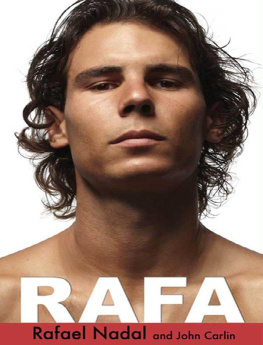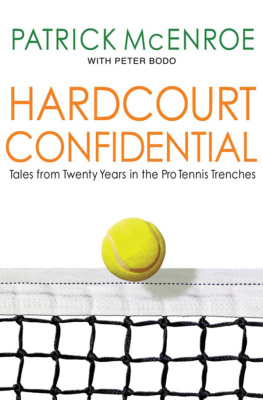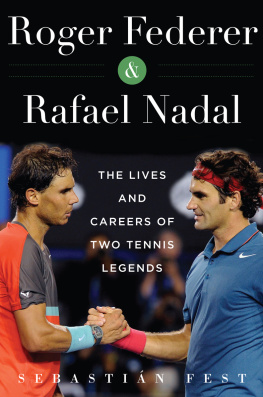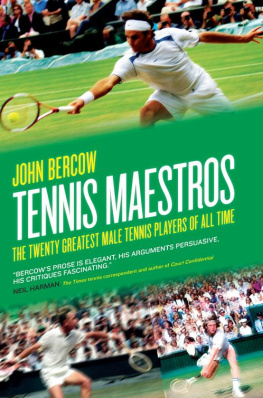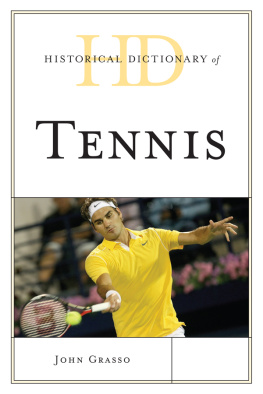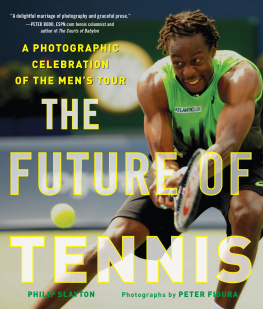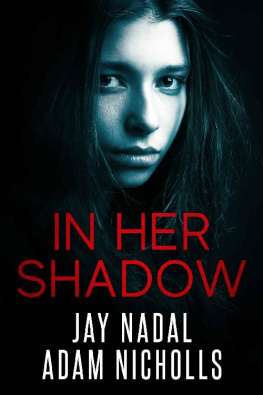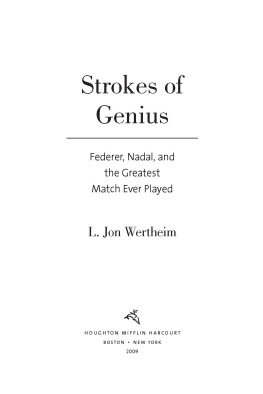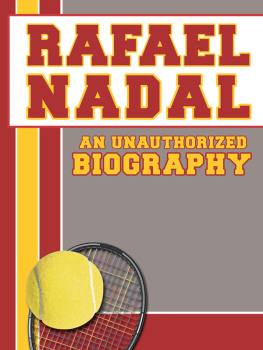RAFA
RAFAEL NADAL
and John Carlin

Contents
The Family
Rafael Nadal: tennis player
Sebastin Nadal: his father
Ana Mara Parera: his mother
Maribel Nadal: his sister
Toni Nadal: his uncle and coach
Rafael Nadal: his uncle
Miguel ngel Nadal: his uncle, and former professional
football player
Mariln Nadal: his aunt and godmother
Don Rafael Nadal: his paternal grandfather
Pedro Parera: his maternal grandfather
Juan Parera: his uncle and godfather
The Team
Carlos Costa: his agent
Rafael Maym (Titn): his physical therapist
Benito Prez Barbadillo: his communications chief
Joan Forcades: his physical trainer
Francis Roig: his second coach
Jordi Robert (Tuts): his Nike handler and close friend
ngel Ruiz Cotorro: his doctor
Jofre Porta: a coach when he was young
The Friends
Mara Francisca Perell: his girlfriend
Carlos Moy: former world number one tennis player
Tomu Salva: childhood tennis-playing friend
Miguel ngel Munar: his oldest friend
CHAPTER 1
THE SILENCE OF THE CENTRE COURT
T he Silence, thats what strikes you when you play on Wimbledons Centre Court. You bounce the ball soundlessly up and down on the soft turf; you toss it up to serve; you hit it and you hear the echo of your own shot. And of every shot after that. Clack, clack; clack, clack. The trimmed grass, the rich history, the ancient stadium, the players dressed in white, the respectful crowds, the venerable traditionnot a billboard advertisement in viewall combine to enclose and cushion you from the outside world. The feeling suits me; the cathedral hush of the Centre Court is good for my game. Because what I battle hardest to do in a tennis match is to quiet the voices in my head, to shut everything out of my mind but the contest itself and concentrate every atom of my being on the point I am playing. If I made a mistake on a previous point, forget it; should a thought of victory suggest itself, crush it.
The silence of the Centre Court is broken when a points done, if its been a good pointbecause the Wimbledon crowds can tell the differenceby a shock of noise; applause, cheers, people shouting your name. I hear them, but as if from some place far off. I dont register that there are fifteen thousand people hunched around the arena, tracking every move my opponent and I make. I am so focused I have no sense at all, as I do now reflecting back on the Wimbledon final of 2008 against Roger Federer, the biggest match of my life, that there are millions watching me around the world.
I had always dreamt of playing here at Wimbledon. My uncle Toni, who has been my coach all my life, had drummed into me from an early age that this was the biggest tournament of them all. By the time I was fourteen, I was sharing with my friends the fantasy that Id play here one day and win. So far, though, Id played and lost, both times against Federerin the final here the year before, and the year before that. The defeat in 2006 had not been so hard. I went out onto the court that time just pleased and grateful that, having just turned twenty, Id made it that far. Federer beat me pretty easily, more easily than if Id gone out with more belief. But my defeat in 2007, which went to five sets, left me utterly destroyed. I knew I could have done better, that it was not my ability or the quality of my game that had failed me, but my head. And I wept after that loss. I cried incessantly for half an hour in the dressing room. Tears of disappointment and self-recrimination. Losing always hurts, but it hurts much more when you had your chance and threw it away. I had beaten myself as much as Federer had beaten me; I had let myself down and I hated that. I had flagged mentally, I had allowed myself to get distracted; I had veered from my game plan. So stupid, so unnecessary. So obviously, so exactly what you must not do in a big game.
My uncle Toni, the toughest of tennis coaches, is usually the last person in the world to offer me consolation; he criticizes me even when I win. It is a measure of what a wreck I must have been that he abandoned the habit of a lifetime and told me there was no reason to cry, that there would be more Wimbledons and more Wimbledon finals. I told him he didnt understand, that this had probably been my last time here, my last chance to win it. I am very, very keenly aware of how short the life of a professional athlete is, and I cannot bear the thought of squandering an opportunity that might never come again. I know I wont be happy when my career is over, and I want to make the best of it while it lasts. Every single moment countsthats why Ive always trained very hardbut some moments count for more than others, and I had let a big one pass in 2007. Id missed an opportunity that might never come again; just two or three points here or there, had I been more focused, would have made all the difference. Because victory in tennis turns on the tiniest of margins. Id lost the last and fifth set 62 against Federer, but had I just been a little more clearheaded when I was 42 or even 52 down, had I seized my four chances to break his serve early on in the set (instead of seizing up, as I did), or had I played as if this were the first set and not the last, I could have won it.
There was nothing Toni could do to ease my grief. Yet he turned out, in the end, to be right. Another chance had come my way. Here I was again, just one year later. I was determined now that Id learn the lesson from that defeat twelve months earlier, that whatever else gave way this time, my head would not. The best sign that my head was in the right place now was the conviction, for all the nerves, that I would win.
At dinner with family and friends and team members the night before, at the house we rent when I play at Wimbledon, across the road from the All England Club, mention of the match had been off-limits. I didnt expressly prohibit them from raising the subject, but they all understood well enough that, whatever else I might have been talking about, I was already beginning to play the match in a space inside my head that, from here on in until the start of play, should remain mine alone. I cooked, as I do most nights during the Wimbledon fortnight. I enjoy it, and my family thinks its good for me. Something else to help settle my mind. That night I grilled some fish and served some pasta with shrimps. After dinner I played darts with my uncles Toni and Rafael, as if this were just another evening at home in Manacor, the town on the Spanish island of Mallorca where I have always lived. I won. Rafael claimed later that hed let me win, so Id be in a better frame of mind for the final, but I dont believe him. Its important for me to win, at everything. I have no sense of humor about losing.
At a quarter to one I went to bed, but I couldnt sleep. The subject we had chosen not to talk about was the only one on my mind. I watched films on TV and only dozed off at four in the morning. At nine I was up. It would have been better to have slept a few hours more, but I felt fresh, and Rafael Maym, my physical therapist, who is always in attendance, said it made no differencethat the excitement and the adrenaline would carry me through, however long the game went on.
For breakfast I had my usual. Some cereal, orange juice, a milk chocolate drinknever coffeeand my favorite from home, bread sprinkled with salt and olive oil. Id woken up feeling good. Tennis is so much about how you feel on the day. When you get up in the morning, any ordinary morning, sometimes you feel bright and healthy and strong; other days you feel muggy and fragile. That day I felt as alert and nimble and full of energy as I ever had.
It was in that mood that at ten thirty I crossed the road for my final training session at Wimbledons Court 17, close to the Centre Court. Before I started hitting, I lay down on a bench, as I always do, and Rafael Maymwho I nickname Titnbent and stretched my knees, massaged my legs, my shoulder, and then gave special attention to my feet. (My left foot is the most vulnerable part of my body, where it hurts most often, most painfully.) The idea is to wake up the muscles and reduce the possibility of injuries. Usually Id hit balls for an hour in the warm-up before a big match, but this time, because it was drizzling, I left it after twenty-five minutes. I started gently, as always, and gradually increased the pace until I ended up running and hitting with the same intensity as in a match. I trained with more nerves than usual that morning, but also with greater concentration. Toni was there and so was Titn, and my agent, Carlos Costa, a former professional tennis player, who was there to warm up with me. I was more quiet than usual. We all were. No jokes. No smiles. When we wrapped up, I could tell, just from a glance, that Toni was not too happy, that he felt I hadnt been hitting the ball as cleanly as I might have. He looked reproachfulIve known that look all my lifeand worried. He was right that I hadnt been at my sharpest just then, but I knew something that he didnt, and never could, enormously important as he had been in the whole of my tennis career: physically I felt in perfect shape, save for a pain on the sole of my left foot that Id have to have treated before I went on court, and inside I bore the single-minded conviction that I had it in me to win. Tennis against a rival with whom youre evenly matched, or whom you have a chance of beating, is all about raising your game when its needed. A champion plays at his best not in the opening rounds of a tournament but in the semi-finals and finals against the best opponents, and a great tennis champion plays at his best in a Grand Slam final. I had my fearsI was in a constant battle to contain my nervesbut I fought them down, and the one thought that occupied my brain was that today Id rise to the occasion.
Next page

